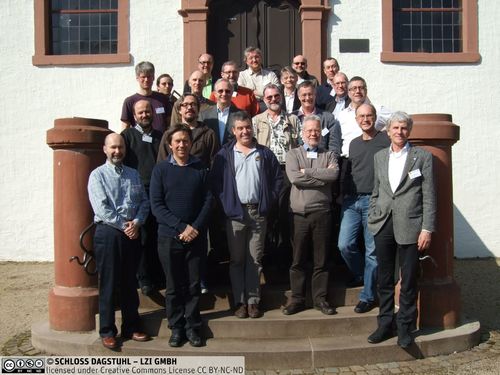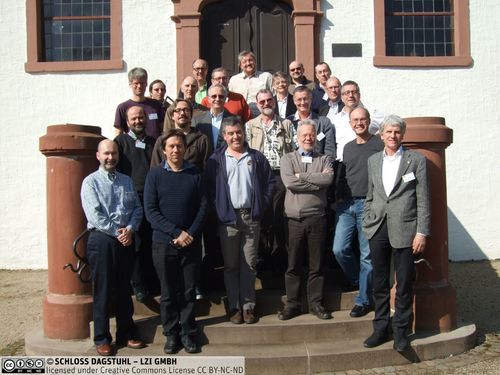Dagstuhl Perspectives Workshop 14112
Massive Open Online Courses: Current State and Perspectives
( Mar 10 – Mar 13, 2014 )
Permalink
Organizers
- Pierre Dillenbourg (EPFL - Lausanne, CH)
- Claude Kirchner (INRIA - Le Chesnay, FR)
- John C. Mitchell (Stanford University, US)
- Martin Wirsing (LMU München, DE)
Contact
- Annette Beyer (for administrative matters)
Publications
- Massively Open Online Courses, Current State and Perspectives (Dagstuhl Perspectives Workshop 14112). Pierre Dillenbourg, Claude Kirchner, John C. Mitchell, and Martin Wirsing. In Dagstuhl Reports, Volume 4, Issue 3, pp. 47-61, Schloss Dagstuhl - Leibniz-Zentrum für Informatik (2014)
- Massive Open Online Courses: Current State and Perspectives (Dagstuhl Perspectives Workshop 14112). Pierre Dillenbourg, Armando Fox, Claude Kirchner, John Mitchell, and Martin Wirsing. In Dagstuhl Manifestos, Volume 4, Issue 1, pp. 1-27, Schloss Dagstuhl - Leibniz-Zentrum für Informatik (2014)
Online education is not new; Massively Open Online Courses (MOOCs) are. Their uniquely powerful combination of classical digital teaching tools (videos, audios, graphics or slides), individualized tools for acquiring and validating knowledge, and appropriate use of dedicated social networks makes them a new and formidable means of accessing knowledge and education. If backed up with scientific and pedagogical excellence, MOOCs allow one to reach and teach simultaneously tens of thousands and even hundreds of thousand of learners in a new pedagogical dynamic.
Of the numerous MOOCs initiatives that have recently emerged, especially in the US and Europe, a few seem to be surfacing with an extremely important impact. This creates a very new situation and indeed can be considered as the informatics community's first main impact on knowledge dissemination and teaching. MOOCs will very likely induce a radical change in teaching mechanisms and their links to the economic and production systems. The consequences with respect to the transmission of culture and educational content, and on society as a whole, will be deep.
This situation raises many questions in a range of different disciplines with respect to ethics, intellectual properties, and data protection and privacy, necessitating an in-depth understanding of the current state of affairs and future trends in these research areas.
This Dagstuhl Perspectives Workshop will bring together leading researchers and practitioners working in or on MOOCs initiatives in order to provide a forum for discussing participants' current experiences and initial feedback. Scientists from several key disciplines, including for example informatics, pedagogy, economy, psychology and sociology, will meet to discuss the current state of the situation and envision the next steps. In particular, they will address questions relative to current research on the pedagogical engineering of MOOCs, economical models, ethical issues, the technical development of platforms, and sharing.
As described in Dagstuhl policies this Dagstuhl Perspectives Workshops will ask participants to look beyond the current high-profile interest in MOOCs and to ideate on important research questions over the next 10 years in all areas of informatics in cooperation with online and hybrid educational formats.
One key outcome of this Dagstuhl Perspectives Workshop will be the publication of a Dagstuhl Manifesto on MOOCs. Such a manifesto should include a discussion of research directions within a larger context, such as the relevance of MOOCs to society and economy, their applications, and their relationship to other fields. Its audience goes beyond the inner circle of experts and should include policy makers.
Online education is not new; Massively Open Online Courses (MOOCs) are. Their uniquely powerful combination of classical digital teaching tools (videos, audios, graphics or slides), individualized tools for acquiring and validating knowledge, and appropriate use of dedicated social networks makes them a new and formidable means of accessing knowledge and education. If backed up with scientific and pedagogical excellence, MOOCs allow one to reach and teach simultaneously tens of thousands and even hundreds of thousand of learners in a new pedagogical dynamic.
Of the numerous MOOCs initiatives that have recently emerged, especially in the US and Europe, a few seem to be surfacing with an extremely important impact. This creates a very new situation and indeed can be considered as the informatics community's first main impact on knowledge dissemination and teaching. MOOCs will very likely induce a radical change in teaching mechanisms and their links to the economic and production systems. The consequences with respect to the transmission of culture and educational content, and on society as a whole, will be deep.
This situation raises many questions in a range of different disciplines with respect to ethics, intellectual properties, and data protection and privacy, necessitating an in-depth understanding of the current state of affairs and future trends in these research areas.
This Dagstuhl Perspectives Workshop brought together leading researchers and practitioners working in or on MOOCs initiatives in order to provide a forum for discussing participants' current experiences and initial feedback. Scientists from several key disciplines, including informatics, pedagogy, economy, psychology and sociology, have meet to discuss the current state of the situation and envision the next steps. In particular, they have addressed questions relative to current research on the pedagogical engineering of MOOCs, economical models, ethical issues, the technical development of platforms, and sharing.
The first day of the workshop consisted of a series of presentations in which each participant presented those topics and developments he or she considered most relevant for the future development of MOOCs. On the second and third day the participants divided into several working groups according to the main thematic areas that had been identified on the first day.
From the working groups outcomes, a Manifesto has been worked out and will appear in the Dagstuhl Manifestos Collection.
 Pierre Dillenbourg, Claude Kirchner, John C. Mitchell, and Martin Wirsing
Pierre Dillenbourg, Claude Kirchner, John C. Mitchell, and Martin Wirsing
- François Bry (LMU München, DE) [dblp]
- Yiwei Cao (IMC AG - Saarbrücken, DE) [dblp]
- Carlos Delgado Kloos (Universidad Carlos III de Madrid, ES) [dblp]
- Pierre Dillenbourg (EPFL - Lausanne, CH) [dblp]
- Yannis Dimitriadis (University of Valladolid, ES) [dblp]
- Jens Dittrich (Universität des Saarlandes, DE) [dblp]
- Gilles Dowek (INRIA - Paris, FR) [dblp]
- Douglas H. Fisher (Vanderbilt University, US) [dblp]
- Antoine Flahault (Paris Descartes University, FR) [dblp]
- Armando Fox (University of California - Berkeley, US) [dblp]
- Serge Garlatti (Telecom Bretagne - Brest, FR) [dblp]
- David Glance (The Univ. of Western Australia - Crawley, AU) [dblp]
- Jörg M. Haake (FernUniversität in Hagen, DE) [dblp]
- Jeff Haywood (University of Edinburgh, GB) [dblp]
- Heinz Ulrich Hoppe (Universität Duisburg-Essen, DE) [dblp]
- Claude Kirchner (INRIA - Le Chesnay, FR) [dblp]
- Alain Mille (University Claude Bernard - Lyon, FR) [dblp]
- John C. Mitchell (Stanford University, US) [dblp]
- Mike Sharples (The Open University - Milton Keynes, GB) [dblp]
- Marcus Specht (Open University - Heerlen, NL) [dblp]
- Armin Weinberger (Universität des Saarlandes, DE) [dblp]
- Martin Wirsing (LMU München, DE) [dblp]
- Volker Zimmermann (IMC AG - Saarbrücken, DE) [dblp]
Classification
- multimedia
Keywords
- massively open online courses
- mooc



 Creative Commons BY 3.0 Unported license
Creative Commons BY 3.0 Unported license
